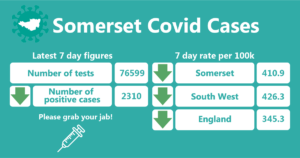Welcome to the latest edition of the weekly Somerset Covid-19 update for key stakeholders. This update is produced on behalf of the Somerset Covid-19 Engagement Board and is designed to provide a weekly update on the current Covid-19 situation in Somerset.
The number of cases of Covid-19 in Somerset have reduced again this week, although they do remain high. Many of our cases continue to be among school and college-age children as well as staff within education settings and so we have an extensive schools section later in this update. This week we have also seen a greater proportion of our cases among people over 60 years of age.
This clearly shows Covid-19 is still present in Somerset and reminds us all to continue to wear a face-covering in crowded and enclosed spaces, regularly wash hands and undertake lateral flow tests if we don’t have symptoms and are meeting people who are outside our own household. If people have any symptoms of Covid-19 such as a high temperature, a new and continuous cough, a loss or change to the sense of taste or smell, they should self-isolate immediately and book a PCR test.
As we have mentioned in previous updates, booster jabs are now available for people over 50 years old, or people over 16 years old considered to be at risk. To receive a booster jab, it must be six months or more since the receipt of the second vaccine, but you can now book your appointment five months after your last dose. The boosters are very important as they significantly reduce the likelihood of serious illness or hospitalisation should you catch Covid-19 so, if offered, please make a booking without delay.
Latest Covid Dashboard: The following link below will take you to our website: Coronavirus (COVID-19) (somerset.gov.uk) Then scroll down the page until you get to ‘COVID-19 Dashboard’ in the list. Click on this and the dashboard will open.
‘Remember, everyone can catch it, anyone can spread it’.



| David Fothergill, Leader of Somerset County Council Twitter: @DJAFothergill | Trudi Grant, Director of Public Health Twitter: @SomersetDPH | Clare Paul, Cabinet Member for Public Health and Wellbeing Twitter: @Clarepaul_ |

In the week up to 6 November, approximately 76,599 tests were carried out across the county with 2,310 new confirmed cases. The rates have decreased in the last reporting week to 410.9 per 100.000. This is below the South-West average but is higher than the national average.
Hospitalisation data for Somerset has decreased to 75 Covid-19 in-patients in Somerset hospitals. The number of people in hospital with Covid-19 is higher than last year during wave 1 and wave 2 of the pandemic.
This Week’s Headlines:
The main items featured in this week’s update are:
- Workplace, Care and School settings
- Vaccination and Covid Booster update
- Testing Update
- Latest Covid Catch-up Film
- Resources and further information
Workplaces: This week we have seen more outbreaks in office workplaces. The Delta variant in circulation is much more transmissible than the Alpha variant, so sharing workspaces with others increases the risk of transmission. As in previous waves, we are seeing outbreaks linked to socialising in the workplace, for example at lunchtimes or in staffrooms. Remember, the more contacts you have, the greater the risk of transmission.
So, if it works for the individual and the business, it still makes sense to work from home, in whole or in part. When people are going into the office, use lateral flow tests and stay away if you have tested positive. Be especially aware that spending a long time in poorly ventilated areas with other people, perhaps in a meeting room, greatly increases risk of infection if a Covid-19 positive person is present.
Find out more about what you can do to keep working safely to reduce the risk of transmission, via the HSE website.
Care Sector: In line with the high case rates in our area, there continues to be cases and outbreaks of Covid-19 in our social care settings. Infection Prevention Control (IPC) measures are essential to reduce the risk of Covid-19 as well as other infections. Good IPC practices require continuous monitoring and regular staff training is key to prevent not only Covid-19 but other winter infections.
Regular Covid-19 testing, vaccination promotion, ventilation, monitoring for a wide spectrum of symptoms and prompt action where infection is suspected is essential, as well as promotion of health and wellbeing in general.
Recognising and reporting outbreaks
- Any suspected outbreak (influenza, Covid-19, norovirus/gastroenteritis) needs to be reported to our local health protection team at UK Health Security Agency (UKHSA) on 0300 3038162 or [email protected]
- UKHSA health protection teams and regional public health laboratories are prepared to arrange multi-virus testing when required for investigation of suspected outbreaks of respiratory viruses in care homes, enabling the right treatment pathways
- Influenza-like illness (ILI): managing outbreaks in care homes – updated 5 November 2021
- Adult social care: Covid-19 winter plan 2021 to 2022 – published 3 November 2021
Winter vaccinations
- Both Covid-19 booster vaccinations and flu vaccinations are available
- The Covid-19 vaccination national booking service can be accessed by frontline health and social care staff to book a booster vaccine appointment through self-referral for those who had their 2nd dose at least 6 months ago.
- Book online via the NHS website or phone 119
- Winter vaccinations communications assets are available, including posters, social media graphics CARE: Winter vaccinations campaign assets | Campaign Resource Centre
Care home testing
There have been reports of a higher than usual number of void PCR test results in our area of the South-West. This is currently being investigated by the UK Health Security Agency (UKHSA). If you receive void test results, please:
- Check the swabs you are using are within the expiry date
- Re-test as soon as possible
- Inform [email protected] if you notice this within your setting
Emotional support
Support is available for care workers in Somerset. Please take a look at what is on offer at the Somerset Emotional Wellbeing Colleague Hub – a dedicated online resource for all health and care workers in Somerset.
Further information
More information about Covid-19 in care settings can be found on the Adult Social Care webpage.
Schools and Early Years settings: Following the letter to each school dated 21.10.21, from the Director of Public Health for Somerset, as promised, we have again risk assessed schools in Somerset. Whilst infection rates are declining, our local rates remain significantly higher than the England rate. Based on the risk assessment, we are advising all schools to keep in place the previously recommended level of control measures until the end of November 2021. There are small number of schools for which we are advising a change in their previous measures, each of these schools will receive an individualised letter. If a school does not receive an individualised letter, our advice is to maintain the control measures set out on 21.10.21.
In addition to the basic and additional measures, here is a brief reminder of the enhanced measures we recommended to schools:
- Continue to use face coverings in secondary schools in communal areas such as corridors, when movement occurs between lessons and on school transport if used
- Reduce mixing between groups of students as much as possible. Consider pausing ‘whole school’ assemblies and other “large gatherings” indoors
- Promote social distancing and reduce crowding where possible; minimise pinch points in the school day, for example, staggered lunch times, or start times
- Reinforce social distancing and good infection prevention control amongst staff (ventilation and touchpoint cleaning especially in areas where staff gather)
- Any close or household contacts of confirmed cases of Covid-19 to book a PCR test and whilst awaiting test results, undertake a daily LFD test and only attend school if this is negative- this includes students of primary age under parental discretion. The new LFD tests are nasal swabs only and much easier to use than previous stocks
Somerset County Council are asking schools to reinforce these measures to parents, in particular regular LFD testing of eligible people, so we can continue education for all children. Over 70,000 LFD test results were reported by parents in October. Emphasising this and the importance of reporting positive and negative tests is important to help us understand the spread of the virus. At the current high prevalence levels, LFD tests are good at identifying infectious individuals, which can prevent them attending schools and spreading the infection.
In October, Directors of Public Health colleagues in the South-West, alongside regional colleagues published a consensus statement (21.10.21) which recommended schools review their contingency plans within the national contingency framework. This was reviewed on 10th November 2021 and colleagues unanimously agreed the advice should remain in place until the end of November. You can read the consensus statement on the Support Services for Education website. The Regional Schools Commissioner was a part of this discussion.
SCC Public Health continue to be the first port of call for all mainstream schools with cases of Covid-19. The United Kingdom Health Security Agency (formerly Public Health England) now take the lead on Covid-19 cases within special schools and residential settings. Their contacts have not yet changed and remain [email protected] or the DfE helpline (option 1) 0800 0468 687.
Covid-19 School Toolkit | Support Services for Education
If in doubt please email them on [email protected] or call 01823 356 100
Symptomatic and Asymptomatic Testing: Parents or carers of a school or college age child, health, care or education staff are requested to undertake twice weekly asymptomatic testing using LFDs, so those you meet or work with are kept safe from infection. This is at parents’ discretion for primary school age children.
Please remind parents in any communication from school to take up the offer of free tests and record their results on NHS Test and Trace.
The GOV.UK website notify service enables education settings to remind pupils and parents to test and report easily, quickly and at no extra cost. DfE have also provided a toolkit to support schools in encouraging pupils and students to test and report regularly.
SCC PH advice remains consistent with national guidance:
- Only use twice weekly LFD testing for asymptomatic cases
- Make sure you do an LFD according to the instructions and at least 30 minutes after eating or drinking
- If you get a positive LFD or have symptoms get a PCR and use the supervised PCR testing route at test centre to get the best quality test
- Encourage secondary school age children to wear face coverings in crowded or enclosed places, for example on school transport
- Take up the offer of vaccination
If you think your child is a close contact but has not been contacted directly by NHS Test and Trace then they should take a PCR test via the GOV.uk website or by calling 119.
When ordering a PCR test it is important to check the box (online) or tell 119 ‘I’ve been told to get a test by my health protection team’ and not ‘I’ve been told to get a test by my school or nursery’
Childhood Immunisation Programme: The Somerset Foundation Trust manage the childhood immunisation programme with SAINT (School Age Immunisation Nursing Team, part of the NHS). SAINT deliver the nasal flu vaccination to all schools in Somerset between October and December every year.
This year, the Covid-19 and flu vaccines are being rolled out together for 12-15 year olds through the schools immunisation programme. Immunisation sessions should still go ahead as planned when a school has a Covid-19 outbreak, unless specifically advised not to by a health protection team (HPT) or Director of Public Health (DPH). Other factors which may impact on the ability to offer immunisation sessions include the number of children still in school and whether the school has had to send some year groups home or close due to lack of staff.
SAINT will work with the school to ensure children who missed vaccinations because they were self-isolating at home or for other reasons, including exclusion, or missed consent deadline are re-offered immunisation at an appropriate time in the future. Visit the SAINTS website for the flu vaccination programme.
12-15 year olds who have missed their school vaccination date (due to absence or illness) are advised to book their vaccination online. Book or manage your coronavirus vaccination via the NHS website.
Bookable slots for 12-15-year-olds
There are a significant number of bookable slots for 12 -15-year-olds at vaccination centres at, Somerset Motor Museum in Sparkford and Firepool in Taunton. You can book through the National Booking Service online or by calling 119.
Please note: If you’ve had a positive Covid-19 test, you need to wait 4 weeks (28 days) before booking. This starts from the date you had the test
The vaccine is not mandatory; the decision to have the vaccine is a personal decision. The role of schools is to facilitate access for those who wish to receive the vaccine.
Vaccination Update: For the latest information about the Somerset vaccination programme visit the NHS website.
Booster Vaccines: Like some other vaccines, levels of protection for the Covid-19 vaccine may begin to wane over time. With Covid-19 rates still high again this winter, the booster dose will help extend the protection you gained from your first 2 doses, giving you longer term protection against becoming seriously ill from Covid-19.
If you fall into any of the following groups, you are eligible for a booster jab.
- People aged over 50 and over
- People who live and work in care homes
- Frontline health and social care workers
- People aged 16 and over who are a main carer for someone at high risk from Covid-19
- People aged 16 and over who live with someone who is more likely to get infections (such as someone who has HIV, has had a transplant or is having certain treatments for cancer, lupus or rheumatoid arthritis)
People who are pregnant and in one of the eligible groups can also get a booster.
Pfizer Booster jabs are being offered to those who are eligible, at least six months after your last Covid-19 vaccination. You will be offered the Pfizer Covid vaccination irrespective of which vaccine was given to you for your first or second vaccination. (If you are unable to have the Pfizer/BioNTech or Moderna vaccine, for example if you experienced a heavy allergic reaction to your first two doses, you may be offered a booster dose of the Oxford/AstraZeneca vaccine please let staff at the vaccination centre know you suffered an allergic reaction).
To book your booster jab you can visit the Covid National Booking Service online, call 119, or wait to be contacted by the NHS to book your appointment. You can book anytime within the four weeks leading up to six month period from when you had your last vaccination.
When you book your appointment, the National Booking Service will give you a choice of places where you can receive your jab including community pharmacies, some GP practices and our large vaccination centres at Firepool in Taunton, Somerset Motor Museum in Haynes and Minehead District Hospital. You do not need to return to the place where you had your first vaccination.
It remains very important for anyone who has not had their first or second dose of the Covid-19 vaccine, to do so as soon as possible. While the first dose starts to provide some immunity, it is only two weeks after the second dose when you are considered to be ‘fully vaccinated’. And please accept your offer of a booster jab should you receive one.
Testing Update: In the near future, there will be a fourth brand of lateral flow test introduced, by MP Biomedicals. The exact date of the release of this type of LFD is to be confirmed soon. Below is the table which demonstrates the differences between the 4 kits, but things to be aware of with this new kit:
- Nasal swabbing required only.
- Swab is to be left in the extraction buffer solution for one minute
- Result to be read after 15 minutes, no longer than 20 minutes.
Full kits instructions can be found here: Your step-by-step guide for Covid-19 self-testing and a video showing how to perform the MP Biomedical LFD can be found via YouTube.
As with all lateral flow tests, please ensure the following:
- You read the instructions for use prior to performing the test
- You do not eat, drink or vape for 30 minutes before performing the test
- Do not perform the test if you have symptoms of Covid-19, order a PCR test online, via the GOV.uk website or call 119 and self isolate until the result is known.
- Perform lateral flow tests at least twice weekly and report all results on via the GOV.uk website or by calling 119, when the result is known.
- Do not use LFDs if you have tested positive for Covid-19 in the previous 90 days
- Ensure the kits are stored between 15-30OC
Covid Catch-up Film: This week Clinton discusses the importance for us all to accept the offer of a third, or booster, vaccination when we receive it.
The film can be viewed on YouTube.
Resources and further information: Please do keep an eye our Healthy Somerset website, which has a huge amount of information and resources to help keep everyone healthy happy and safe at this time.
For the latest local information as well as digital resources, posters and flyers please visit the Somerset County Council website.
The Somerset Local Outbreak Management Plan outlines how we, the council, will work with the NHS Test and Trace Service, PHE, the NHS and other partners to ensure a whole system approach to preventing and managing local outbreaks. This can be found here.
Finally, please like them on Facebook, follow them on Twitter and share their posts with your networks to help them in communicating these important messages. Follow their Director of Public Health Twitter account too.

